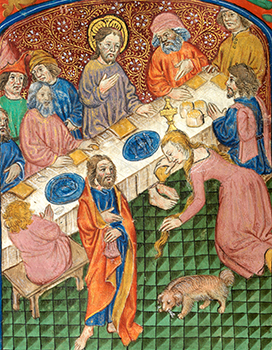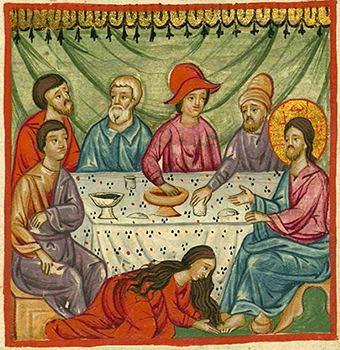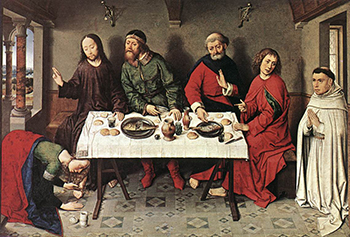From Our Archives
Debie Thomas, Beauty and Breaking (2022); Debie Thomas, While You Still Have Me (2019); Mary Graves, Passionate Love (2010).
This Week's Essay
John 12:3, "She wiped his feet with her hair."
For Sunday April 6, 2025
Fifth Sunday in Lent
Lectionary Readings (Revised Common Lectionary, Year C)
Psalm 126
Phillippians 3:4b-14
John 12:1-8
At Costco recently I saw a bottle of whiskey on sale for $36,999.99. After texting a photo of it to my family, I had this sort of fantasy of buying the whiskey and drinking it with my friend Chris. He's dying from a glioblastoma, and had called me to say, "Dan, it's time to drink the good stuff." Something like that is what happens in the gospel this week.
The gospel of John begins with a story about divine extravagance. Jesus filled six stone pots with water, and then turned them into 750 bottles of the best wine for a wedding in Cana. John writes that this was the "first sign" that Jesus did. Empty pots used for ritual purity overflowed with wine for profane celebration.
The God that Jesus revealed isn't stern or stingy. He's a God of generosity and extravagance. He's like a manager who pays a full day's wages for one hour of work. He's the God who asks Jonah if he's angry because he is generous to the pagan Ninevites. He's the waiting father who welcomes home a wayward son with a ring, a robe, and a party. In turning water to wine, Jesus offers us excess for our emptiness.
Then, this week, John ends his gospel with a story about human extravagance. Mary anoints Jesus with perfume that's worth a year's wages. The anointing of Jesus at Bethany is the last event in John before Jesus's "triumphal entry" and the ensuing passion narrative. Mark places it on Wednesday of Holy Week.
So, from start to finish in the life of Jesus, God's kingdom is characterized by excess and extravagance, both received from God and reciprocally returned back to him by us.
 |
|
Mary Magdalen anointing Christ's feet. Illuminated manuscript, c. 1500.
|
John's story is reminiscent of another woman of prolific extravagance, the poor widow who "gave all she had to live on." That wasn't much by human standards, of course, but Jesus said it was more than all that the rich people gave combined.
Extravagance moves both ways. It's reciprocal, both given and received, by both God and his people. Sometimes God is the giver; at other times we are. At the wedding in Cana, God provided a surplus of wine. At the dinner in Bethany, Mary gave a gift of expensive perfume. Whether divine or human, given or received, these acts of radical abundance are signs of what life is like with the living God.
At Cana, the divine excess was for a wedding celebration. At Bethany, Mary's extravagance foretold of an imminent death.
If the suspiciously similar-but-different story in Luke 7:36–50 describes the same event, the anointing of Jesus by a woman is one of the rare stories that's told in all four gospels. It was a powerful memory for the earliest believers. Jesus says her act was so singular that from that time forth, "wherever this gospel is preached, what she has done will also be told, in memory of her." (Mark 14:9).
And how's this for unintended irony — Matthew and Mark never name this person; they simply call her "a woman." Luke describes her as "a sinful woman." There's a long history of identifying the woman as Mary Magdalene, although the gospels never say this. John alone tells us that it was Mary, the sibling of Martha and Lazarus.
What is the Spirit of God saying in this story of wild excess during the season of Lenten self-denial?
During the last week of his life, Jesus stayed in Bethany, about two miles from Jerusalem. At a dinner in his honor, Mary poured a pint of pure nard (an intensely aromatic oil) imported from India on his feet. Then she wiped his feet with her hair. The aroma filled the house.
 |
|
Mary anoints Jesus, Ilyas Basim Khuri Bazzi Rahib (17th century Coptic monk).
|
Almost every detail of this story breaks the social boundaries of the day. A dinner to honor Jesus ends with acrimony and arguments. A woman lies down beside Jesus. She lets down her hair, then caresses his feet with outrageously expensive oil. What was Mary doing?
The disciples were indignant: "Why this waste? We could have sold this perfume and given the money to the poor." Yes, after three years with Jesus, the disciples had learned this lesson well, that care for the poor characterizes the people of God. But believe it or not, and although there's never an excuse to ignore them, there's something more important than care for the poor.
"They rebuked her harshly," writes Mark.
"Leave her alone," said Jesus, "she's done a beautiful thing."
In fact, Mary did more than she knew. Anointing Jesus was a gesture of personal devotion; but it was also a prophetic act: "When she poured this perfume on my body, she prepared me for my burial." Jesus wasn't just a wandering sage or renegade rabbi; he's the Anointed One. Anointed by Mary, yes, but especially by God. In Hebrew, he's "the Messiah."
"She did what she could," said Jesus.
And that's what we do in our Lenten disciplines. We do what we can. Mary's anointing didn't save Jesus from his tragic fate. Nor will our Lenten practices solve our every problem. But with Mary we do what we can.
We give our old selves to God without restraint, all that we have and all that we are. In return, we trust God for a new self shaped by his unlimited love. In the words of this week's psalmist, we sow in tears, with the hope to reap in joy.
In the reading from Isaiah, God invites us to "forget the former things. Do not dwell on the past. See, I'm doing a new thing. I'm making a way in the desert, streams in the wasteland."
 |
|
Christ in the House of Simon, by Dieric Bouts, 1440s.
|
In the epistle for this week, Paul says the same thing—"forgetting what lies behind and reaching forward to what lies ahead."
Paul says that nothing compares to the reciprocal giving and receiving of God's extravagance: "Whatever was to my profit I now consider loss for the sake of Christ. What is more, I consider everything a loss compared to the surpassing greatness of knowing Christ Jesus my Lord, for whose sake I have lost all things. I consider them rubbish, that I may gain Christ. I want to know Christ and the power of his resurrection and the fellowship of sharing in his sufferings, becoming like him in his death, and so, somehow, to attain to the resurrection of the dead."
No, we haven't attained this, Paul admits. And to his radical aspirations he ads a realistic "somehow."
But Mary shows us the way. "She did what she could." In response to the extravagance of God's goodness, we offer our unbounded gratitude.
"I will take what you give," Mother Teresa once prayed, "and I will give what you take."
NOTE: Matthew 26:6–13 = Mark 14:1–11 = Luke 7:36–50 = John 12:1–8.
Weekly Prayer
Louise Gluck
You want to know how I spend my time?
I walk the front lawn, pretending
to be weeding. You ought to know
I'm never weeding, on my knees, pulling
clumps of clover from the flower beds: in fact
I'm looking for courage, for some evidence
my life will change, though
it takes forever, checking
each clump for the symbolic
leaf, and soon the summer is ending, already
the leaves turning, always the sick trees
going first, the dying turning
brilliant yellow, while a few dark birds perform
their curfew of music. You want to see my hands?
As empty now as at the first note.
Or was the point always
to continue without a sign?Louise Gluck (1943–2023) was an American poet. Her many awards included a National Book Award, the 2020 Nobel Prize in Literature, and the Pulitzer Prize. From 2003 to 2004 she was Poet Laureate of the United States. Gluck was also a professor of poetry at Yale and Stanford.
Dan Clendenin: dan@journeywithjesus.net





